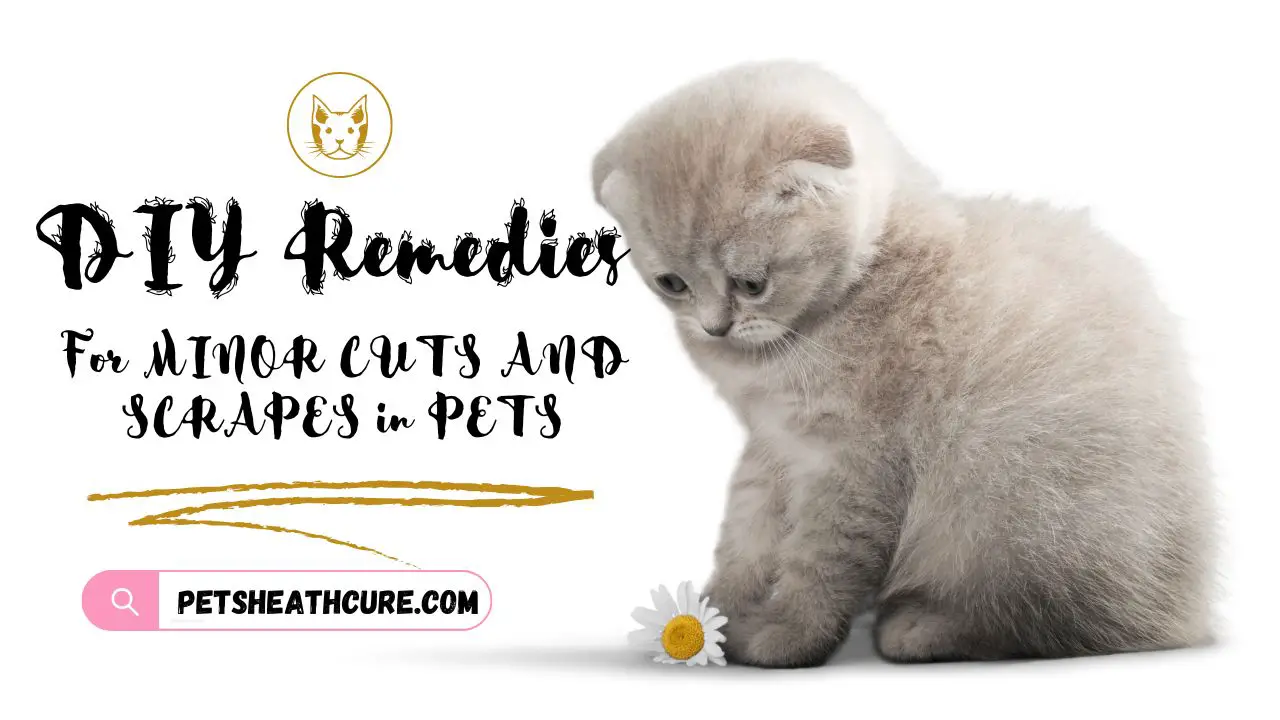Introduction
Pets are part of our family, and just like humans, they are prone to minor injuries such as cuts and scrapes. Knowing how to treat these injuries at home can save time, reduce your pet’s discomfort, and ensure quicker healing. This comprehensive guide will walk you through DIY remedies for minor cuts and scrapes in pets to ensure your furry friend is safe and healthy.
Understanding Minor Cuts and Scrapes in Pets
Minor cuts and scrapes occur when the skin is superficially damaged but doesn’t involve deep wounds or excessive bleeding. Common causes include rough play, sharp objects, or minor accidents during outdoor activities.
Signs That Your Pet Has a Minor Cut or Scrape
- Bleeding or oozing
- Licking or biting the injured area
- Visible redness or swelling
- Slight limping or favoring a limb
- Flinching when the area is touched
Precautions Before Treating Pet Injuries
Before applying any remedies, take the following precautions:
- Keep Calm: Pets can sense stress, so ensure you approach them calmly.
- Secure the Pet: Restrain your pet gently to avoid further injury or resistance.
- Assess the Severity: If the wound is deep, excessively bleeding, or shows exposed tissue, consult a veterinarian immediately.
Step-by-Step Guide to Treat Minor Cuts and Scrapes in Pets
1. Gather Necessary Supplies
You’ll need:
- Clean towels or gauze
- Sterile saline solution or warm water
- Antiseptic solution or pet-safe wound cleaner
- Non-stick bandages or breathable wraps
- Scissors (with rounded tips)
- Pet cone (if necessary) to prevent licking
2. Clean the Wound
- Use warm water or a sterile saline solution to gently flush the wound.
- Avoid using hydrogen peroxide or alcohol as these can damage tissues and delay healing.
- Gently pat the area dry with a clean towel or gauze.
3. Apply an Antiseptic
- Use a pet-safe antiseptic or antibacterial cream to disinfect the area.
- Apply a thin layer to avoid ingestion if your pet licks the wound.
4. Cover the Wound
- Place a non-stick pad over the wound to prevent debris from entering.
- Use a breathable bandage to secure the pad, but ensure it’s not too tight.
- Change the bandage daily or whenever it becomes wet or dirty.
5. Monitor the Healing Process
- Check for signs of infection such as increased redness, swelling, or foul odor.
- Ensure your pet doesn’t scratch or bite the wound. Use a cone if necessary.
DIY Natural Remedies for Pets’ Minor Injuries
1. Coconut Oil
Coconut oil has natural antimicrobial properties. Gently apply a small amount to the wound to prevent infections and promote healing.
2. Aloe Vera
Fresh aloe vera gel can soothe irritated skin and speed up recovery. Apply a thin layer directly to the affected area.
3. Chamomile Tea Compress
Soak a chamomile tea bag in warm water, cool it slightly, and use it as a compress to reduce inflammation and soothe the wound.
4. Honey
Raw honey is a natural antiseptic. Dab a small amount onto the wound to prevent bacteria growth and promote faster healing.
When to Seek Veterinary Assistance
While DIY remedies are effective for minor injuries, it’s essential to consult a veterinarian if:
- The wound doesn’t heal within a week.
- There’s excessive swelling or pus.
- Your pet shows signs of fever or lethargy.
- The wound was caused by a bite or unknown object.
Preventing Future Cuts and Scrapes
- Keep sharp objects and hazardous materials out of reach.
- Trim your pet’s nails regularly to prevent accidental scratches.
- Supervise outdoor play to minimize injuries from rough terrain or sharp objects.
- Provide a clean and safe environment for your pet to roam freely.
FAQs
Q1: Can I use human antiseptics on my pet’s wound?
It’s best to avoid human antiseptics like hydrogen peroxide or alcohol as they can harm your pet’s sensitive skin. Always opt for pet-safe alternatives.
Q2: How often should I change my pet’s bandage?
Bandages should be changed daily or whenever they become wet or dirty to prevent infections.
Q3: What should I do if my pet keeps licking the wound?
Use an Elizabethan collar (cone) to prevent licking, as it can delay healing or introduce bacteria.
Q4: Is it normal for my pet to limp after a minor injury?
Yes, slight limping is normal, but if it persists for more than 48 hours, consult your vet.
Q5: Can I use essential oils for pet wounds?
Some essential oils can be toxic to pets. Always consult a vet before using any oils on your pet’s wounds.
By following these DIY remedies and safety tips, you can effectively manage minor cuts and scrapes in pets at home, ensuring their speedy recovery.


